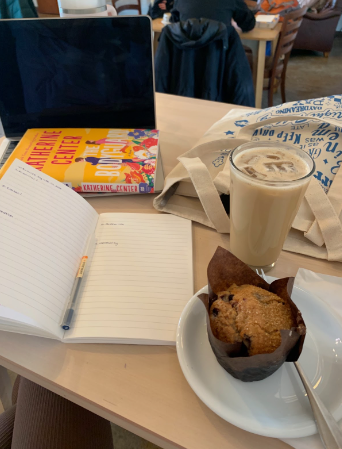Feeling lost and out of place

Little things such as working at a cafe instead of at home alone can allow a person to regain their sense of belonging.
March 13, 2023
There is a common cultural phenomenon known as culture shock. Culture shock is defined as “the feeling of disorientation experienced by someone who is suddenly subjected to an unfamiliar culture, way of life, or set of attitudes.” This can occur when a person travels or moves to a new country. Experiencing this may lead the person to feelings of confusion, anxiety or just overall loss. Culture shock is widespread and well known, but not as many people know about what is referred to as reverse culture shock.
What is reverse culture shock? Marquette University refers to it as “simply a common reaction to returning home from studying abroad.” Imagine a person leaving home as one version of themselves, only to return back home as a completely new version. While away, a person puts their everyday life on pause. They say “see you later” to their friends, family, house, job and everything. They then develop new routines, friendships and connections to their temporary living environment. Living in/visiting a different country can often mean every day feels exciting. Even if the actual events aren’t super glorious, they are new and have a shiny feeling to them. Soon enough, these new routines and friendships start to feel like the norm. As the person abroad is developing a new persona, they often lose touch with their old life back home. Not realizing they are not the only ones growing and changing. Simultaneously, their home lives and the people in them are as well. This becomes apparent once one has returned back home thus resulting in reverse culture shock.
Why does reverse culture shock produce a challenge? Well, reverse culture shock brings along many feelings that are uncomfortable and tough to get through. For starters, once back home the person may feel bored. The sparkle of their life away is suddenly diminished and they are thrown back into the mundane routines of their real lives. Often, these tasks such as work and school seem dull and pointless. They have to work extra hard to make their lives meaningful, for example, taking themselves out for an exciting meal or glorifying their morning cappuccino. They may also experience feeling unwanted or as though nobody truly understands them. This is very easy to understand when imagining stepping into their shoes. Their friends and family at home know them as one person, their friends abroad know them as another and they no longer align with either of these perspectives. While away, they experienced so many new undertakings that altered their identity. This also results in them disconnecting from their previous relationships. It is almost impossible for them to reinsert themselves back home and act as though nothing has changed. Alone, either of these may leave a person feeling empty inside but there are so many more emotions that could occur. North Center College reports that these individuals often feel like “no one wants to listen, it is hard to explain, reverse homesickness, people see the ‘wrong’ changes, people misunderstand, people misinterpret behavior, feelings of alienation, inability to apply new knowledge and skills, fear of losing the experience.” How can an individual recover from reverse culture shock? Although it may be easier to wallow in the sadness of it all, it is extremely important for them to work on revalidating their current lives. A few ways they can develop comfort are by participating/getting involved in various social groups, finding someone to talk to or creating a physical display of their memories, such as a scrapbook. An important thing for them to remember is that they are not alone in feeling this way. It is extremely normal and there is definitely someone out there that would be able to relate to their feelings.








